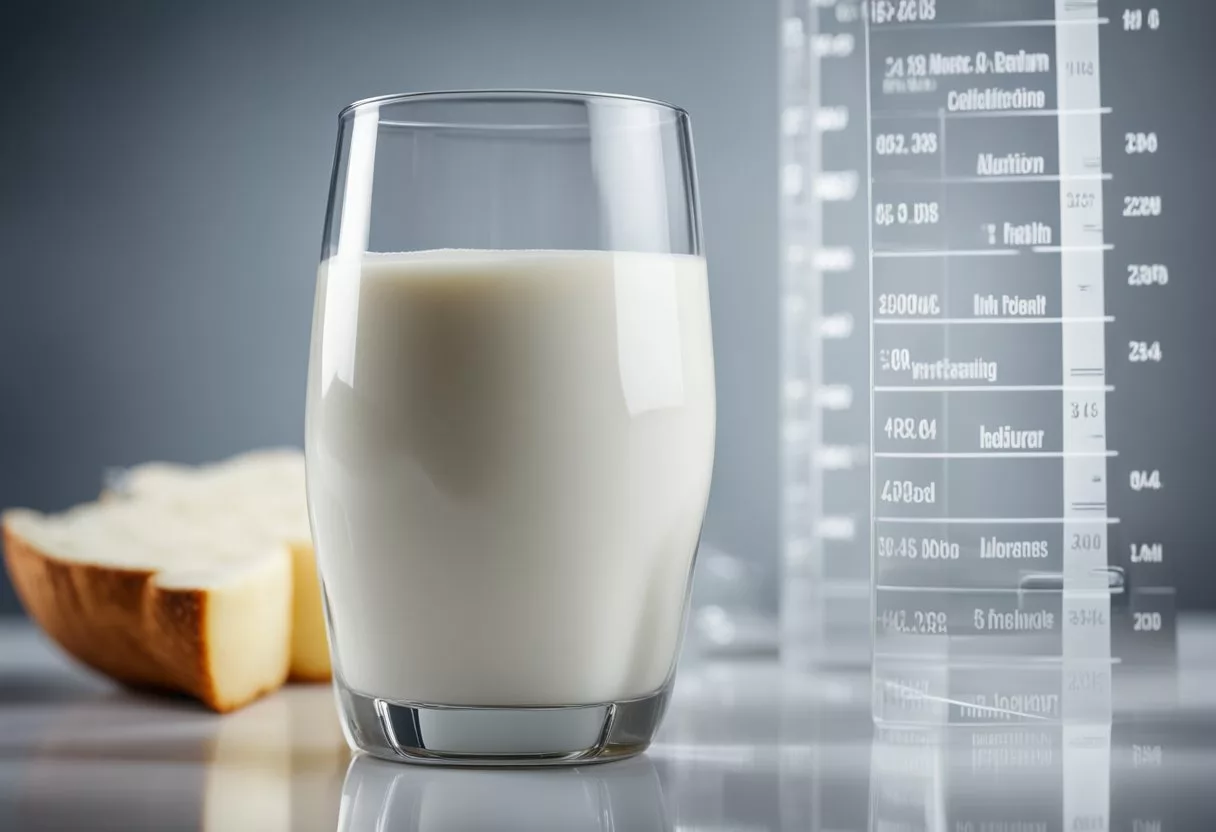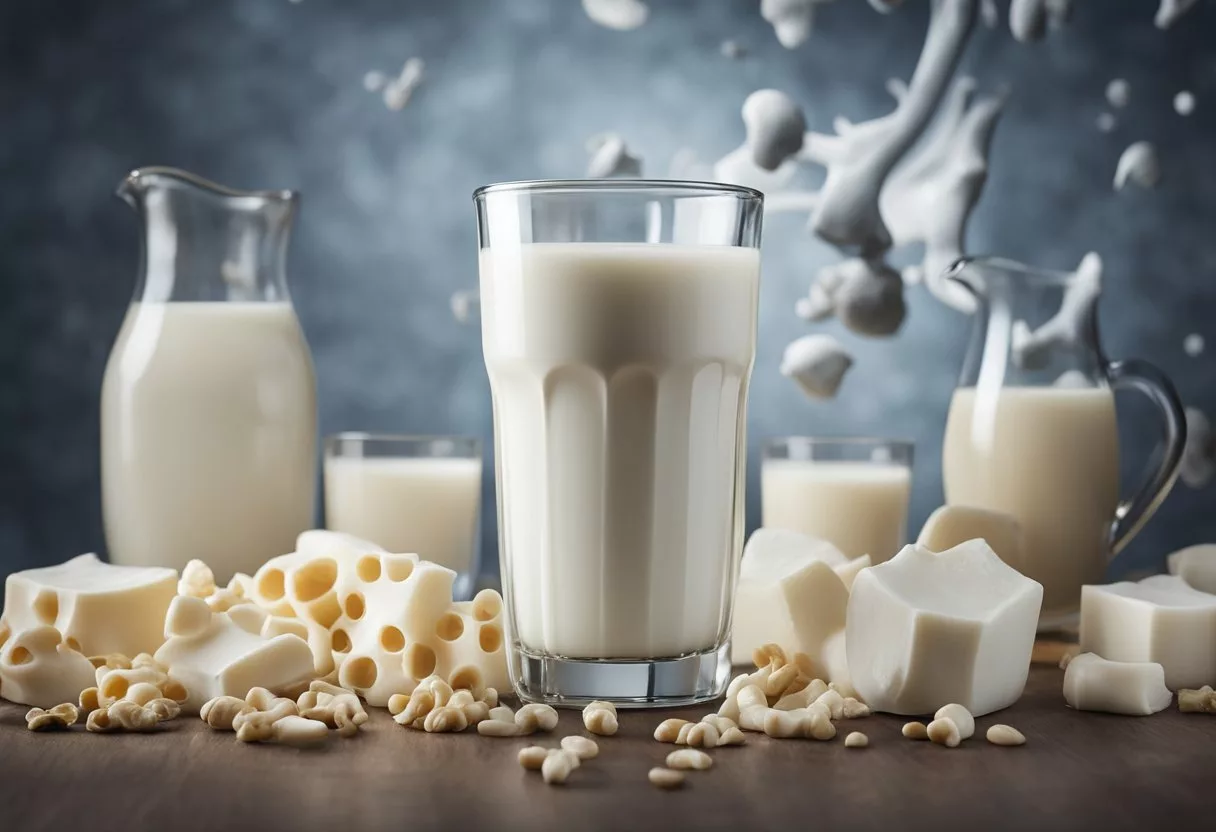Milk is a staple in many households, and its health benefits have been touted for decades. But what happens to your body if you drink milk every day? The answer is not as straightforward as you might think.

On one hand, milk is an excellent source of nutrients such as calcium, vitamin D, and protein, all of which are important for maintaining strong bones and teeth. However, some people may experience negative effects from drinking milk, such as digestive issues or allergies. It is important to understand the potential benefits and drawbacks of consuming milk on a daily basis.
In this article, we will explore the effects of drinking milk every day on the body. We will examine the nutrients found in milk and how they can impact bone health, digestion, and overall wellbeing. Additionally, we will discuss the potential risks associated with consuming milk and how to determine if it is the right choice for you.
Nutritional Profile of Milk

Milk is a nutrient-rich beverage that provides a variety of essential vitamins and minerals to the body. In this section, we will discuss the nutritional profile of milk and its various components.
Vitamins and Minerals in Milk
Milk is an excellent source of calcium, which is important for maintaining strong bones and teeth. According to Harvard T.H. Chan School of Public Health, one cup of milk contains about 30% of the daily recommended intake of calcium. Milk is also a good source of vitamin D, which helps the body absorb calcium. Other vitamins and minerals found in milk include vitamin B12, riboflavin, phosphorus, and potassium.
Protein Content and Quality
Milk is a good source of high-quality protein, which is essential for building and repairing tissues in the body. According to Healthline, one cup of milk contains about 8 grams of protein. Milk contains all the essential amino acids that the body needs to function properly.
Fat Content Variations
The fat content of milk can vary depending on the type of milk. Whole milk contains about 3.25% fat, while skim milk contains less than 0.5% fat. Reduced-fat and low-fat milk contain varying amounts of fat. It is important to note that while whole milk may contain more fat, it also contains more vitamins and minerals than skim milk.
Carbohydrates and Sugars
Milk contains a natural sugar called lactose, which provides energy to the body. According to WebMD, one cup of milk contains about 12 grams of carbohydrates, most of which come from lactose. However, some types of milk may contain added sugars, so it is important to read the label carefully.
In conclusion, milk is a nutrient-rich beverage that provides a variety of essential vitamins and minerals to the body. Its nutritional profile can vary depending on factors such as fat content and whether it is fortified with additional vitamins and minerals.
Health Benefits of Daily Milk Consumption

Milk is a rich source of essential nutrients that are important for maintaining overall health. Regular milk consumption has been associated with potential health benefits, including improved bone health, muscle growth and repair, cardiovascular health, and weight management.
Bone Health and Density
Milk is famously rich in calcium and vitamin D, both of which are crucial for bone health. Calcium is a primary building block for bones and teeth, while vitamin D helps the body absorb calcium more effectively. Drinking milk daily can significantly contribute to bone density, reducing the risk of osteoporosis and other bone-related conditions.
Muscle Growth and Repair
Milk is also an excellent source of protein, which is essential for muscle growth and repair. The protein in milk contains all of the essential amino acids needed for building and maintaining lean muscle mass. Drinking milk after a workout can help to replenish energy levels, repair damaged muscle tissue, and promote muscle growth.
Cardiovascular Health
Milk contains several nutrients that are beneficial for cardiovascular health, including potassium, magnesium, and vitamin D. These nutrients can help to lower blood pressure, reduce the risk of cardiovascular disease, and improve overall heart health.
Weight Management
Milk can also be a helpful tool for weight management. It is a rich source of protein, which can help to promote feelings of fullness and reduce overall calorie intake. Drinking milk as part of a balanced diet can help to maintain a healthy weight and reduce the risk of obesity.
In conclusion, daily milk consumption can provide numerous health benefits, including improved bone health, muscle growth and repair, cardiovascular health, and weight management. Incorporating milk into a balanced diet can help to ensure that the body receives all of the essential nutrients needed for optimal health.
Potential Risks and Side Effects

Drinking milk every day can come with potential risks and side effects. While milk is a good source of essential nutrients, it can also cause issues for certain individuals. In this section, we will discuss some of the potential risks and side effects associated with drinking milk every day.
Lactose Intolerance and Digestive Issues
Lactose intolerance is a common condition that affects many individuals worldwide. It occurs when the body is unable to digest lactose, a sugar found in milk and other dairy products. Symptoms of lactose intolerance can include bloating, gas, diarrhea, and abdominal pain. If you are lactose intolerant, drinking milk every day can exacerbate these symptoms and cause discomfort.
Allergic Reactions to Milk Proteins
Some individuals may be allergic to milk proteins, which can cause an allergic reaction. Symptoms of a milk protein allergy can include hives, itching, swelling, and difficulty breathing. In severe cases, a milk protein allergy can cause anaphylaxis, a life-threatening allergic reaction. If you experience any symptoms of a milk protein allergy, seek medical attention immediately.
Links to Certain Health Conditions
While milk is a good source of essential nutrients, it has been linked to certain health conditions. Some studies have suggested that drinking milk every day may increase the risk of certain cancers, such as prostate and ovarian cancer. Additionally, some research has linked high milk consumption to an increased risk of heart disease. However, more research is needed to fully understand the link between milk consumption and these health conditions.
In conclusion, while milk is a good source of essential nutrients, it can also come with potential risks and side effects. Individuals who are lactose intolerant or allergic to milk proteins should avoid drinking milk. Additionally, those who drink milk every day should be aware of the potential links to certain health conditions and speak with their healthcare provider if they have any concerns.
Considerations for Different Age Groups
Milk for Children and Adolescents
Milk is an important source of calcium and vitamin D, which are essential for the growth and development of bones in children and adolescents. According to a study published in the Journal of Bone and Mineral Research, children who consume milk regularly have a higher bone mineral density than those who do not.
It is recommended that children and adolescents consume at least 2-3 servings of milk or dairy products per day. However, it is important to note that some children may be lactose intolerant and may need to choose lactose-free milk or other sources of calcium and vitamin D.
Milk in Adult Diets
As adults age, their bones become more susceptible to osteoporosis and fractures. Milk is a good source of calcium and vitamin D, which can help prevent these conditions. However, it is important to note that excessive consumption of milk may not be beneficial for all adults.
According to a study published in the British Medical Journal, excessive milk consumption may increase the risk of fractures in women and men. Therefore, it is recommended that adults consume milk in moderation and also consider other sources of calcium, such as leafy greens, nuts, and fortified foods.
In addition, some adults may be lactose intolerant or have other dietary restrictions that prevent them from consuming dairy products. In these cases, it is important to choose alternative sources of calcium and vitamin D to ensure adequate intake.
Overall, milk can be a valuable addition to a healthy diet, especially for children and adolescents. However, it is important to consider individual needs and dietary restrictions when incorporating milk into a daily diet.
Milk Alternatives and Lactose-Free Options
For those who are lactose intolerant or prefer a plant-based diet, there are many milk alternatives available. These alternatives vary in taste, texture, and nutritional content. Here are some of the most popular options:
Plant-Based Milk Varieties
Plant-based milk alternatives are a popular choice for those who are lactose intolerant or vegan. Almond milk, soy milk, oat milk, and coconut milk are some of the most common plant-based milk varieties.
- Almond Milk: Almond milk is a popular choice because it is low in calories and fat. It is also a good source of vitamin E, which is an antioxidant that helps protect cells from damage. Almond milk has a nutty flavor and is a good option for those who are allergic to soy or lactose intolerant.
- Soy Milk: Soy milk is made from soybeans and is a good source of protein. It is also a good source of calcium, vitamin D, and vitamin B12. Soy milk has a creamy texture and a slightly sweet taste.
- Oat Milk: Oat milk is made from oats and is a good option for those who are allergic to nuts or soy. It is a good source of fiber and has a slightly sweet taste. Oat milk is also a good source of vitamins and minerals, including calcium and vitamin D.
- Coconut Milk: Coconut milk is a popular choice for those who are lactose intolerant or allergic to nuts or soy. It has a creamy texture and a slightly sweet taste. Coconut milk is a good source of medium-chain triglycerides (MCTs), which are a type of fat that is easily absorbed by the body.
Lactose-Free Dairy Products
For those who are lactose intolerant but still want to consume dairy products, there are many lactose-free options available. Lactose-free milk, cheese, and yogurt are some of the most common lactose-free dairy products.
- Lactose-Free Milk: Lactose-free milk is made by adding lactase, an enzyme that breaks down lactose, to regular milk. Lactose-free milk has the same nutritional content as regular milk but is easier to digest for those who are lactose intolerant.
- Lactose-Free Cheese: Lactose-free cheese is made by using lactase to break down the lactose in milk. Lactose-free cheese has the same taste and texture as regular cheese but is easier to digest for those who are lactose intolerant.
- Lactose-Free Yogurt: Lactose-free yogurt is made by adding lactase to regular yogurt. It has the same nutritional content as regular yogurt but is easier to digest for those who are lactose intolerant.
In conclusion, there are many milk alternatives and lactose-free options available for those who are lactose intolerant or prefer a plant-based diet. These options vary in taste, texture, and nutritional content, so it is important to choose the one that best fits your needs and preferences.
Incorporating Milk into a Balanced Diet

Daily Serving Recommendations
According to the USDA, one 8-ounce serving (1 cup) of reduced-fat (2%) milk provides 122 calories, 8 grams of protein, and a variety of essential nutrients including calcium, vitamin D, vitamin B12, and potassium. The recommended daily serving of milk for adults is 3 cups per day, while children and adolescents are advised to consume 2-3 cups per day depending on their age and gender.
It is important to note that while milk can be a nutritious addition to a balanced diet, it should not be the sole source of any one nutrient. A variety of foods should be consumed to ensure adequate nutrient intake and to prevent dietary imbalances.
Combining Milk with Other Foods
Milk can be easily incorporated into a balanced diet by combining it with other nutrient-dense foods. For example, adding milk to oatmeal or cereal can increase the protein and calcium content of the meal. Milk can also be used as a base for smoothies, which can be packed with fruits and vegetables for added fiber and vitamins.
When consuming milk with other foods, it is important to pay attention to portion sizes and to choose low-fat or fat-free milk options to limit saturated fat intake. A balanced diet should include a variety of nutrient-dense foods, including fruits, vegetables, whole grains, lean proteins, and healthy fats, in addition to milk and dairy products.
In summary, incorporating milk into a balanced diet can provide a variety of essential nutrients and contribute to feelings of satiety. Following dietary guidelines for daily serving recommendations and combining milk with other nutrient-dense foods can help ensure a well-rounded and nutritious diet.